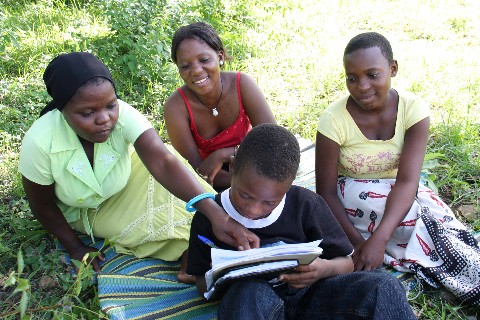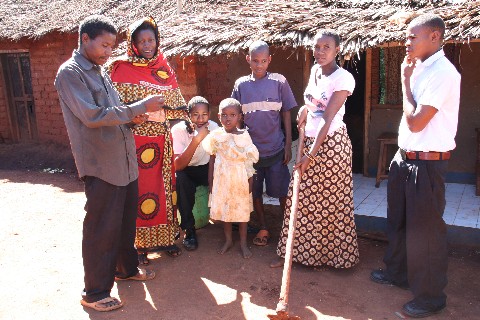Across Tanzania, 1.1 million children have been affected by HIV, with many losing one or both parents to the virus. The majority of these "orphans and vulnerable children" -- even if taken in by compassionate relatives -- struggle to have enough food to eat and to afford school.
Those in the most dire situations face hunger every day, at every mealtime. When things get this bad, children often drop out of school because they can't afford the required uniforms or fees, or because they need to take on day jobs to support themselves and their siblings.
Catholic Relief Services has been working with community-based partners in Tanzania since 2005 to improve this situation, now supporting 35,000 of these children in need. On the northern coast, CRS works with the Catholic Diocese of Tanga and the Anglican Muhesa Hospice Care to provide this assistance using funding from the U.S. President's Emergency Plan for AIDS Relief, also known as PEPFAR.
Below are two stories that describe common problems orphans and other vulnerable children face. Their stories are not exceptions: They're the norm, and they're heartbreaking. The help we're able to provide, particularly through U.S. government assistance, does make a difference. But sadly, most families still struggle to survive in the face of enormous challenges.
Four Alone But United
On Christmas Eve 2003, Evelin Jackson packed a small bag to join her family, taking a few days off from her job as a maid with a family in town. After finishing seven years of school, she had worked the past three to help support her mother and three siblings. Their dad had died of tuberculosis in 1997, and their mom couldn't do it alone, as she kept falling sick.
When Evelin arrived at the house they rented -- on a tract of employee housing for a plastics factory that had shut down years before -- she found her two young sisters and 3-year-old brother in shock. Their mom had died at home a few hours before. They didn't know what to do.
The family had moved to Mafuriko, a village near Tanga on Tanzania's northern coast, years before when their dad took a job with the plastics factory. Their closest relatives were 600-plus miles away on the other side of the country.
 Smiles are slow to spread across the faces of the Jackson children, including the eldest, Evelin, in red, but they are a tight-knit family that supports each other through hunger and hardship. Photo by Debbie DeVoe/CRS
Smiles are slow to spread across the faces of the Jackson children, including the eldest, Evelin, in red, but they are a tight-knit family that supports each other through hunger and hardship. Photo by Debbie DeVoe/CRS
Though Evelin was only 18, she knew it was now her responsibility to support Janeth, then 13; Esther, then 10; and little Julius. She held a modest funeral for their mother. Then, with a small donation from the family she'd been working for, she took over her mom's cake-making business. For the last six years, she has walked 30 minutes down to the main road each day to sell her cakes to travelers and truckers driving up the coast to Mombasa, Kenya.
The Jackson children still live in their family home, alone. Evelin barely earns enough to cover their food and school expenses. Many days they simply don't eat.
In January 2009, a little hope came into their lives. A friend referred them to the CRS-supported Catholic Diocese of Tanga children's program. The project now pays for Julius' and Esther's school expenses, with the government covering Janeth's. This assistance lets Evelin stretch her earnings a little further, but there are still many days when they go hungry. The project provided three weeks' worth of food in March, but this has run out and it's uncertain when more will be distributed.
Evelin is hoping that the small-business training she just received and a possible loan or grant will help expand her business to bring in more money. She has also joined a savings and lending group and saves whatever she can to put back into her business.
I asked Evelin if they feel safe living alone, as I had seen two men hanging out on the porch next door. She said the neighbors treated them like their own children, but that because they're all poor, none can help out.
One day Evelin would like to get married, but she's unwilling to take the risk now, concerned that her husband might later decide to no longer support her young brother and two sisters. For now, she prays for continued assistance with both school fees and food so she can make sure her siblings graduate and find their own jobs.
"I would have liked to continue school, but I didn't have that opportunity," Evelin says, explaining that her Catholic faith helps her accept their situation. "Now there is some improvement. Our past situation was so difficult."
Hunger You Can't Hide
Athumani Bendera knows how HIV can devastate a family. He lost his first wife, sister and eldest brother to the virus. Then his mother died from the stress of these losses. Because his eldest brother was the pillar of the family -- helping to support them all -- and another brother is currently bedridden by HIV, it is now up to Athumani to be the family provider.
First he took in his eldest brother's son Bungire Omary, 17 years old and about to graduate from high school. Then he took in his sister's three children: 20-year-old Hatibu Bakari, also in his last year of high school; 18-year-old Mwanaidi Ally, just starting high school; and 15-year-old Mohamedi Bakari, in sixth grade.
Athumani supports two more: his new wife Saum Shaban and their 4-year-old daughter Zubeda. To cover food and school fees for all the children, Athumani and Saum hire themselves out as day laborers in fields near their village of Mkuzi. But some days their energy flags, as they and their young daughter are also living with HIV.
 Athumani Bendera and his wife do everything they can to support their 4-year-old daughter and four orphaned relatives. It's not always enough. Photo by Debbie DeVoe/CRS
Athumani Bendera and his wife do everything they can to support their 4-year-old daughter and four orphaned relatives. It's not always enough. Photo by Debbie DeVoe/CRS
"When I look at our family and see that it's just me and my wife trying to bring in the bread, sometimes I break down and cry and ask God why," Athumani says. "The children come home from school needing lunch but there's no food, and we're just staring at each other."
"We feel a lot of pain, but we have no choice," Hatibu adds. "Life is dictated."
The family now receives educational assistance from the CRS-supported Muhesa Hospice Care program for orphans and vulnerable children. They were also given mosquito nets and access to free medical care and antiretroviral medications at the local health facility, which is supported by the CRS-led AIDSRelief consortium.
"Before, they chased us from school because of unpaid fees and not having uniforms," Bungire explains, thankful to be a student once again.
"Now food is the major problem," Athumani says. "Because of the lack of rain, we planted corn the last two seasons but harvested nothing."
"I've got to work and work and work. We go to our own fields to cultivate and then also seek day labor to get food for the children," Saum says. "This is not negotiable. We have to have food for them."
It's not that the family doesn't appreciate the help they are receiving. They really do. But the haunted, faraway look in the older children's eyes says what they aren't willing to speak out loud. They still miss their parents, and they just wish that some days, most days, they wouldn't be hungry.
Debbie DeVoe is Catholic Relief Services' Regional Information Officer for East Africa, based in Nairobi, Kenya.
